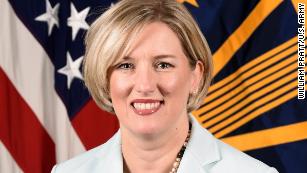Sailors who had returned to pandemic-stricken aircraft carrier retest positive for coronavirus
Five sailors who had returned to the USS Theodore Roosevelt aircraft carrier have retested positive for coronavirus, according to a US Navy spokesperson, despite extensive efforts by the Navy to prevent another outbreak on the ship.
More than 1,000 members of the ship's nearly 4,900-member crew had tested positive following the outbreak aboard the ship in March. The Navy had instituted several screening procedures to enable those who had recovered to return to the ship following two negative tests.
The new positive tests were first reported by The New York Times.
Pentagon removes Defense Production Act point person
Navy spokesperson Cmdr. Myers Vasquez told CNN in a statement Thursday that "five TR Sailors who previously tested COVID positive and met rigorous recovery criteria have retested positive. The Navy recovery criteria exceeds all CDC guidelines."
"The five Sailors developed influenza-like illness symptoms and executed their personal responsibility by reporting to medical for evaluation," Vasquez said. "The Sailors were immediately removed from the ship and placed back in isolation, their close contacts were mapped, and they are receiving the required medical care."
An additional 18 sailors who were in close proximity to those who tested positive have also been taken off the ship out of "an abundance of caution," a US defense official said.
The official said the initial suggestion is the flare-up may be the result of a testing issue rather than a renewed outbreak.
After evacuating some 4,000 sailors from the ship to Guam, the Navy had been returning sailors to the Roosevelt following a period of quarantine and isolation in the hopes of getting the aircraft carrier to sea as soon as possible.
The Navy said Thursday that more than 2,900 sailors have been moved back on board.
Inquiry in progress
The outbreak aboard the aircraft carrier triggered a chain of events that led to the firing of the ship's commanding officer, and the resignation of the acting Navy secretary.
Last month the Navy announced that it was launching a broader inquiry into the circumstances surrounding the outbreak, effectively delaying its initial recommendation that the ship's commanding officer be reinstated.
The announcement came days after Secretary of Defense Mark Esper declined to immediately endorse the Navy's original investigation into the issue, which included a recommendation to reinstate Capt. Brett Crozier.
S officials told CNN that senior Navy officials had recommended that Crozier be reinstated but Esper was not prepared to immediately endorse that recommendation and the wider inquiry was launched the following week.
Crozier was fired for what then-acting Navy Secretary Thomas Modly said was poor judgment for too widely disseminating a warning among Navy officials about the spread of the virus aboard his vessel, a warning that eventually made its way into the press.
While Modly publicly accused Crozier of sending his letter of warning to 20 to 30 people, the email to which the letter was attached shows that Crozier sent it to 10 people including his direct superior, according to a copy of the email obtained by The Washington Post.
"I believe if there is ever a time to ask for help it is now regardless of the impact on my career," Crozier wrote in his email, the contents of which a US official directly familiar with the message confirmed to CNN.
Modly resigned days later over his handling of the incident, actions which included a $240,000 trip to Guam where he slammed Crozier and admonished sailors for giving Crozier a rousing send off in public remarks to the crew.
This story has been updated with a statement from a Navy spokesperson.












